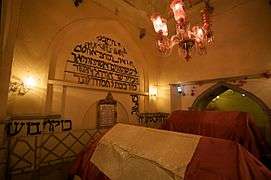Mordecai
Mordecai (or Mordechai, Hebrew: מָרְדְּכַי, Modern: Mordeḵay, Tiberian: Mordǝḵay, IPA: [moʁdeˈχaj]) is one of the main personalities in the Book of Esther in the Hebrew Bible. He is described as being the son of Jair, of the tribe of Benjamin. He was promoted to Vizier after Haman was killed.
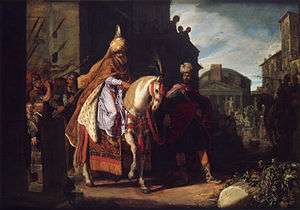
Biblical account
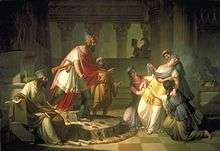
Mordecai resided in Susa (Shushan or Shoushan),[1] the metropolis of Persia (now Iran). He adopted his orphaned cousin (Esther 2:7), Hadassah (Esther), whom he brought up as if she were his own daughter.[2] When "young virgins" were sought, she was taken into the presence of King Ahasuerus and was made queen in the place of the exiled queen Vashti. Subsequently, Mordecai discovered a plot of the king's chamberlains Bigthan and Teresh to assassinate the king. Because of Mordecai's vigilance, the plot was foiled.
Haman the Agagite had been raised to the highest position at court. In spite of the king's decree that all should prostrate themselves before Haman, Mordecai refused to do so. Haman, stung by Mordecai's refusal, resolved to kill not only Mordecai but all Jewish exiles throughout the Persian empire, and won the king's permission to carry out his plan. Mordecai communicated Haman's scheme to Queen Esther, who used her favor with the king to reverse the scheme, leading the king to authorize Jews to kill their enemies, which they did.
During all this, the king had happened to remember Mordecai's service in foiling the assassination plot, and had asked Haman how a person who did a great service to the king should be honored. Haman answered, thinking the question was about him; and the king followed this advice, and honored Mordecai, and eventually made Mordecai his chief advisor. Haman was executed on gallows he had erected for Mordecai.
History
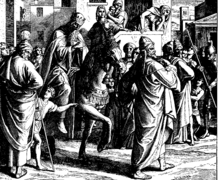
Name
The name "Mordecai" is of uncertain origin but is considered identical to the name Marduka or Marduku (Akkadian: 𒀫𒌓), attested as the name of officials in the Persian court in thirty texts (the Persepolis Administrative Archives) from the period of Xerxes I and his father Darius, and may refer to up to four individuals, one of which might have served as the prototype for the biblical Mordecai.
The Talmud (Menachot 64b and 65a) relates that his full name was "Mordechai Bilshan" (which occurs in Ezra 2:2 and Nehemiah 7:7). Hoschander interpreted this as the Babylonian "Marduk Belshunu" (𒀭𒀫𒌓𒂗𒋗𒉡, dMarduk-Bel-šu-nu, meaning "Marduk is their lord") "Mordecai" being thus a hypocorism.
Another interpretation of the name is that it is of Persian origin meaning "little boy". Other suggested meanings of "contrition" (Hebrew root m-r-d), "bitter" (Hebrew root m-r), or "bruising" (Hebrew root r-d-d) are listed in Hitchcock's Bible Names Dictionary of the late 19th century. There is also speculation that the name is derived from Aramaic mar dochi; mar being a title address for a gentleman, and dochi meaning "one who incurs merit" (cf. Hebrew zoche).
The Talmud provides a Midrashic interpretation of the name Mordechai Bilshan as mara dachia ("pure myrrh") alluding to Exodus 30:23 and ba'al lashon [4] ("master of languages") reminding us that as a member of the Great Assembly he was familiar with many foreign languages.
In the King James Version of the deuterocanonical Greek additions to Esther, his name is spelled as Mardocheus.
Age
The Pentecostal minister Finis Dake interprets the Bible verses Esther 2:5–6 ("Mordecai son of Jair, the son of Shimei, the son of Kish, who had been carried into exile from Jerusalem by Nebuchadnezzar king of Babylon, among those taken captive with Jeconiah king of Judah") to mean that Mordecai himself was exiled by Nebuchadnezzar.[5]
Biblical scholar Michael D. Coogan discusses this as an inaccuracy regarding Mordecai's age.[6][7] In the passage, either Mordecai or his great-grandfather Kish is identified as having been exiled from Jerusalem to Babylon by King Nebuchadnezzar (in 597 BC). If this refers to Mordecai, he would have had to live over a century to have witnessed the events described in the Book of Esther (assuming the biblical Ahasuerus is indeed Xerxes I).[6] However, the verse may be read as referring not to Mordecai's exile to Babylon, but to his great-grandfather Kish's exile—a reading which many accept.[8][9][10][11]
Genealogy
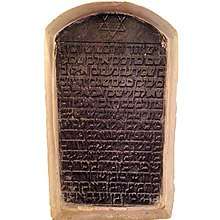
The Targum Sheni gives his genealogy in more detail, as follows: "Mordecai, son of Ya'ir, son of Shim'i, son of Shmida, son of Baana, son of Eila, son of Micah, son of Mephibosheth, son of Jonathan, son of Saul, son of Kish, son of Aviel, son of Tzror, son of Bechorath, son of Aphiah, son of Sh'charim, son of Uziah, son of Sheshak, son of Michael, son of Elyael, son of Amihud, son of Shephatya, son of Psuel, son of Pison, son of Malikh, son of Jerubaal, son of Yerucham, son of Chananya, son of Zavdi, son of Elpo'al, son of Shimri, son of Zecharya, son of Merimoth, son of Hushim, son of Sh'chora, son of Gazah, son of 'Azza, son of Gera, son of Bela, son of Benjamin, son of Jacob the firstborn, whose name is called Israel." [12] The same genealogy is inscribed on a massive metal tablet in the Tomb of Esther and Mordechai.
Prophet status
The Talmud lists Mordecai and Esther as prophets.[13] The Talmud says Mordecai prophesied in the second year of Darius.
Mordecai's genealogy in the second chapter of the Book of Esther is given as a descendant of Kish of the Tribe of Benjamin. Kish was also the name of the father of King Saul, and the Talmud accords Mordecai the status of a descendant of the first King of Israel.[14]
See also
Notes
References
- Esther 2:5–6 of the Bible (New International Version):
- Now there was in the citadel of Susa a Jew of the tribe of Benjamin, named Mordecai son of Jair, the son of Shimei, the son of Kish, who has been carried into exile from Jerusalem by Nebuchadnezzar king of Babylon, among those taken captive with Jeconiah king of Judah.
- Esther, Ch. 2, translation by Rabbi A. J. Rosenberg.
- Moore, Carey A. (1971) Esther. New York: Doubleday. pp. 36–37
- Mordecai went in and told Esther. Now Esther told the king in the name of Mordecai, as it is said, “And Esther told the king in Mordecai’s name” (Esther 22). Hence (the Wise Men) have said: Whosoever tells a matter in the name of its author brings redemption into the world (Pirke De-Rabbi Eliezer)
- Dake's Annotated Reference Bible
- Coogan, Michael and Coogan, David (2009) A Brief Introduction to the Old Testament: The Hebrew Bible in Its Context. New York: Oxford University Press. p. 396. ISBN 0195332725.
- White Crawford, Sidnie (2003) "Esther", in The New Interpreters Study Bible New Revised Standard Version with the Apocrypha, ed. Walter J. Harrison and Donald Senior. Nashville: Abingdon Press. pp. 689–690. ISBN 0687278325.
- Another possibility is Mordechai was carried into exile as he was an infant, and The Torah timeline is only 70 years till Cyrus the Great and only about 10 more till the Purim Epic. See Legacy of Sinai by Z. Fendel, and Purim in the Persian Empire by Landry to understand the Torah chronology, which is in dispute with the current conventional one. New King James Version, translation of Esther 2:6
- Bromiley, Geoffrey W. (Ed.) (1982) International Standard Bible Encyclopedia, Volume II, Wm. B. Eerdmans Publishing Co. p. 159 (entry: Book of Esther)
- Wiersbe, Warren W. (2004) Bible Exposition Commentary: Old Testament History, David C Cook p. 712
- Halley's Bible Handbook
- An Explanatory Commentary on Esther with Four Appendices consisting of The Second Targum Translated From the Aramaic With Notes, Mithra, The Winged Bulls of Persepolis, And Zoroaster by Professor Paulus Cassel, D.D., Berlin, Translated by Rev. Aaron Bernstein, B.D., T&T Clark, 38 George Street, Edinburgh, 1888, pp 298-299, retrieved Oct 25, 2017
- See Megillah 15.
- "Esther's Echo to the Past". aishcom.
External links
| Wikimedia Commons has media related to Mordecai (Biblical figure). |
- Jewish Encyclopedia: Mordecai in Esther and in Rabbinical literature
- Modesty and Myrrh: Mordecai in Kabbalah
